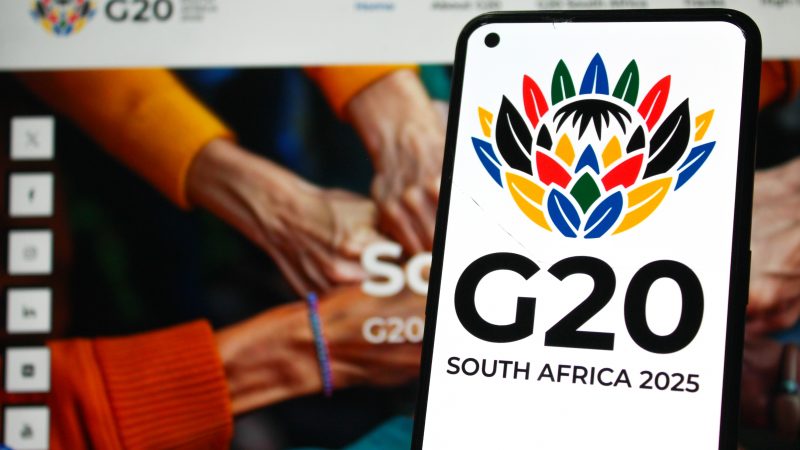
The Prime Minister has just returned from the G20 Summit in South Africa, his 20th foreign trip this year. With President Trump boycotting and Presidents Xi, Milei and Putin choosing not to attend, there have been the inevitable “Never here Keir” headlines and apparent disquiet amongst backbenchers about the PM’s absence given all the domestic priorities at the moment.
For me though, Starmer’s presence in Johannesburg, where I have just returned from, and his active role on the world stage is exactly what we need our Prime Minister to be doing. And the fact that the UK will host the G20 Presidency in 2027 is a great opportunity to make progress on key agendas the UK cares about.
There is no doubt that attempts by the United States to boycott and derail the Johannesburg G20 Summit undermined what was supposed to be a momentous summit; the first on African soil and the twentieth since the forum was elevated to leaders’ level. The fact that the US will take over the Presidency of the G20 next year will destabilise the forum further.
READ MORE: ‘Low growth, low productivity, low ambition: the budget needs to tackle the real problem’
Yet, while the multilateral system may be in a perilous state, there is also no doubt that we need effective multilateral cooperation. From climate change to international migration, from spiralling inequality to keeping our children safe online, so many of the challenges we face at home require international cooperation. No nation can afford to stick its head in the sand and pretend that domestic action alone will deliver a more prosperous or stable future. So many of the macroeconomic challenges the Chancellor faces in crafting her budget this week – from trade tariffs to coordinating wealth taxes – are shaped by global conditions. So it makes good sense to try to shape those factors.
The last few G20 presidencies have broadened the agenda of the forum beyond financial stability to issues that affect humanity’s wellbeing and resilience. Indonesia prioritised pandemic recovery and energy transition financing in the face of climate change; Brazil broke new ground by placing the taxation of super-rich individuals on the G20 agenda; South Africa commissioned Professor Joseph Stiglitz and a group of eminent economists to look at what can be done to tackle inequality.
Subscribe here to our daily newsletter roundup of Labour news, analysis and comment– and follow us on Bluesky, WhatsApp, X and Facebook.
The US, even before Trump, was never a champion of these agendas and, rather than have them in the room amending and blocking, this summit showed that other countries can work together to deliver progress. The mini-lateral initiatives involving coalitions of the willing that have been coming out of forums like this are the building blocks of a new global governance for a multipolar world.
So, even if a Trump presidency in 2026 goes back to basics and doesn’t make progress on broader structural issues facing the global economy, the UK has the chance in 2027 to reboot the G20 and deliver tangible progress on the things that matter to people and planet. An independent assessment by five think tanks of the G20’s effectiveness over the last two decades found that the forum has been good at fighting fires but not so good at fixing the foundational issues. The UK Presidency should be about addressing those foundations.
Share your thoughts. Contribute on this story or tell your own by writing to our Editor. The best letters every week will be published on the site. Find out how to get your letter published.
Eighty years ago, the UK helped shape the current international system based on human rights and the rule of law. Today, the UK has the chance to play an active role in ushering in a new system that is grounded in these same values but is fit for a multipolar world in which the Global South is rightly demanding a greater say, and in which established powers such as the US and Russia cannot be relied on.
-
- SHARE: If you have anything to share that we should be looking into or publishing about this story – or any other topic involving Labour– contact us (strictly anonymously if you wish) at [email protected].
- SUBSCRIBE: Sign up to LabourList’s morning email here for the best briefing on everything Labour, every weekday morning.
- DONATE: If you value our work, please chip in a few pounds a week and become one of our supporters, helping sustain and expand our coverage.
- PARTNER: If you or your organisation might be interested in partnering with us on sponsored events or projects, email [email protected].
- ADVERTISE: If your organisation would like to advertise or run sponsored pieces on LabourList‘s daily newsletter or website, contact our exclusive ad partners Total Politics at [email protected].




More from LabourList
Letters to the Editor – week ending 15th February 2026
‘Labour council candidates – it’s tough, but all is not lost’
‘Labour won’t stop the far right by changing leaders — only by proving what the left can deliver’